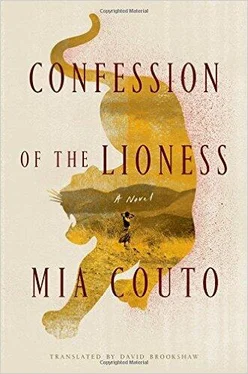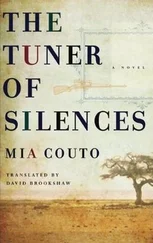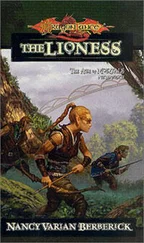My husband remained silent. Even when I threatened him, he didn’t do anything …
I don’t know what to answer. Dona Naftalinda gets up and gazes at the path down which the hunters have disappeared. While still stoking the fire, she murmurs:
I don’t know what they’re looking for in the bush. The lion is right here in the village.
* * *
After night has fallen, the administrator drops by our house. He is agitated, something in the ceremony of the hunters has left him scared. He wants us to organize ourselves for an expedition immediately. He urges us to seize the initiative and kill the lions ourselves.
We can’t have these traditionalists getting the better of us.
Florindo Makwala expects some sort of declaration from me, a commitment to act quickly. But I only make a decision after he has left. Under the flickering light of an oil lamp, I inspect my equipment while, at my request, the writer takes responsibility for the vehicle, the fuel, and the flashlights. My instructions to Gustavo are delivered tersely, in an almost military tone. When we go to bed, I explain myself as if to compensate for the authoritarian way my orders were given:
We’ve got to resolve this quickly. I don’t like the atmosphere that’s being produced.
* * *
Early the next morning, at first light, I drive the vehicle along faintly marked tracks.
Why didn’t we bring the tracker? the writer asks fearfully.
Genito has been drinking. Apart from that, I want you to get an idea of the terrain. This is a journey of exploration.
Will we know how to get back? Gustavo asks.
From the backseat, the administrator is in no doubt: We’ll get back without any difficulty at all. Even though he’s not from Kulumani, he already knows the area. His wife, Naftalinda, accused him of governing while shutting himself away in his office. But it’s not true.
I scarcely listen to him, as I’m too busy looking out for animal tracks.
Hanifa was right — the lions have been here.
After a few kilometers we enter one of those clearings that have been opened up to protect the fields where the crops are planted. In the middle of this space there is a leafy tree, and by its bulky trunk we find two half-dressed young boys tied up and with clear signs of having been beaten. We stop and get out of the jeep to find out what happened there.
What’s wrong? Florindo Makwala asks in Portuguese.
The boys look at us as if they’ve been forbidden to speak. The administrator tries to get them to talk, this time in Shimakonde. In vain. They remain silent. Patiently, Florindo insists. They reply by shaking their heads, without ever uttering a word. Makwala tells us what he thinks has happened:
These poor wretches have been accused of being makers of lions. The hunters tied them up when they passed by this way last night. When they return later, they’ll carry out their justice.
When we free their wrists, the boys stand there motionless, as if stuck to the trunk of the tree.
You can go , we encourage them.
Where? one of them finally asks.
Wherever you want. You’re free now.
They don’t move. To me, they seem to have been incorporated into the vegetable matter of the tree. We leave them, while the condemned boys remain rooted to the shadow of their fear. They’ll stay there until their executioners return.
* * *
I start driving again along paths that are covered in elephant grass. I seem to be traveling in a boat, among green waves rippling away as far as the horizon. The jeep is advancing so slowly that walking would be faster.
At the top of a hill, I stop the vehicle, take off my hat, and pretend to search the sky.
Are we lost? Gustavo asks anxiously.
It’s good to be lost. It means there are possible routes. Things get serious when you run out of routes.
I’m asking whether you are still able to find any routes.
Out here in the bush, it’s the routes that come and find us.
I hear Florindo Makwala’s laugh behind me. The writer’s face bears a semblance of humiliation. All my words, all my silence have the effect of an accusation: He is from the city; he can’t even come to terms with the ground he treads. The truth of the matter is this: Here in this world, Gustavo needs me as his teacher even to walk along on his own two feet.
* * *
When we get back to the jeep, the sun is at its height and the heat causes mirages in the long grass.
I could do with a whiskey on the rocks , Florindo jokes.
The two of them swap rude jokes. All of a sudden I order them to keep quiet. I pretend to be listening carefully to something that has escaped their notice. My solemn tone gives them a fright:
Be quiet, don’t leave the car. Under any circumstances, do you hear?
Crouching low, my gun at the ready, I pretend to choose the quietest path and gradually disappear among the bushes. After that, silence reigns, a terrifying solitude surrounds those who wait in the car, frozen with fear. I hear them muttering to each other.
How long is he going to take? Florindo asks.
Their mumbled conversation, which only serves to keep their apprehension at bay, is suddenly interrupted as I decide to fire into the air. To produce even greater fear, I burst headlong out of the undergrowth, leaping over shrubs and yelling for us to get out of there. The writer jumps behind the wheel and the jeep lurches forward at startling speed.
What’s happened, Archie? the writer asks, tremulous.
I can’t tell you.
The administrator remains silent. If I can’t recount the cause of my terror, then what has happened escapes human reason. When we arrive back in the village, I retire without saying a word. From my room, I hear Florindo and Gustavo talking:
What in heaven’s name happened?
How would I know?
I’m beginning to suffer the same beliefs as these wretched folk. Who knows, maybe he saw one of those things …
One of those things…?
Yes, the lame serpent, for example.
The administrator explains himself: In the village there’s a serpent that moves around over the silence of ceilings and over distant paths. This venomous creature seeks out happy people in order to bite and poison them, without their ever being aware. This is why, in Kulumani, everyone suffers from the same unhappiness. Everyone is scared, scared of life, scared of love, even scared of their friends. Some folk call this monster a “devil.” Others call it a shetani. But most call it the “lame serpent.” The writer interrupts this long narrative:
Forgive me, my dear administrator, but as far as I am concerned, this serpent is ourselves.
Mariamar’s Version: FIVE. Some Honey Eyes
It is easier to hear a pretty girl’s murmur than a lion’s roar.
— ARAB PROVERB
It was my honey eyes that captivated Archie Bullseye when he visited us for the first time sixteen years ago. The hunter found me on the side of the road and, without knowing it, saved me from the forays of Maliqueto Próprio, the policeman. I’ve already talked about this. But I didn’t mention that Archie had returned some days later to make overtures and promises. He said he wanted to take me away to the city. And that we would be happy and forget about all that we had gone through before.
Come with me , the hunter insisted. Let’s find happiness together.
Terrified, I refused. What he was promising was far beyond what I could ever dream. I looked around me to see whether someone was listening to us. We were talking in the kitchen yard, that little space where women most forget about what it is to live. I looked at the stove that was forever lit, the firewood piled up, the saucepans laid out facedown. I examined all this as if it were the work of no one at all. As if the embers were not gathered up from our kitchen to light a neighbor’s fire. As if women’s hands were not ensuring that the fire never went out.
Читать дальше












